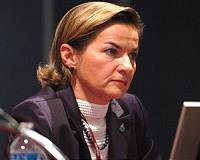 |
Cardiff, UK (SPX) Apr 5, 2011 Explaining climate change risk to non-scientists - citizens and politicians - has not been as effective as it should be, according to a new collaborative research paper published in the journal Nature Climate Change this week. Despite much research that demonstrates potential dangers from climate change, public concern has not been increasing. One theory is that this is because the public is not intimately familiar with the nature of the climate uncertainties being discussed, and as such it does little to support decision-making and change behaviour. "A major challenge facing climate scientists is explaining to non-specialists the risks and uncertainties surrounding potential climate change", says a new Perspectives piece published in the science journal. "Few citizens or political leaders understand the underlying science well enough to evaluate climate-related proposals and controversies," the authors write, at first appearing to support the idea of specialized knowledge - that only climate scientists can understand climate research. But, co-author Professor Baruch Fischhoff quickly dispels the notion. "The goal of science communication should be to help people understand the state of the science, relevant to the decisions that they face in their private and public lives. All of our climate-related options have uncertainties, regarding health, economics, ecosystems, and international stability, among other things," he says. Professor Nick Pidgeon an environmental psychologist at Cardiff University's School of Psychology, and Professor Fischhoff, a social and decision scientist at Carnegie Mellon University in Pennsylvania, wrote the article together, titled, "The role of social and decision sciences in communicating uncertain climate risks." "The temptation, in the face of rising climate scepticism, has been to simply emphasise the communication of scientific facts. But we need to move on from a sterile debate about whether global warming is happening or not, to recognise that climate change poses fundamental questions of decision making and risk," said co-author Pidgeon. Key to effective communications is what the authors call "strategic organisation" and "strategic listening." Strategic organisation involves working in cross-disciplinary teams that include, at a minimum, climate scientists, decision scientists, social and communications specialists and other experts. Strategic listening encourages climate scientists, who often have little direct contact with the public, to overcome flawed intuitions of how well they communicate. Strategic listening asks scientists to go beyond intuitive feeling and consider how well they communicate by using systematic feedback and empirical evaluation. "I think that it is good for scientists to be in contact with the public, so that they can learn about its concerns and see how well, or poorly, they are communicating their knowledge," says Fischhoff. "That way they can do a better job of producing and conveying the science that people need."
Share This Article With Planet Earth
Related Links Cardiff University Climate Science News - Modeling, Mitigation Adaptation
 UN climate chief warns on Kyoto Protocol deadline
UN climate chief warns on Kyoto Protocol deadlineBangkok (AFP) April 4, 2011 Commitments by most developed countries to cut carbon emissions are likely to expire at the end of next year without a new round of legally binding pledges, the UN's climate chief warned Monday. Christiana Figueres said governments needed to start preparing for a gap on the expiry of pledges under the Kyoto Protocol, which has formed the foundation of the world's efforts to cut the emissions ... read more |
|
| The content herein, unless otherwise known to be public domain, are Copyright 1995-2010 - SpaceDaily. AFP and UPI Wire Stories are copyright Agence France-Presse and United Press International. ESA Portal Reports are copyright European Space Agency. All NASA sourced material is public domain. Additional copyrights may apply in whole or part to other bona fide parties. Advertising does not imply endorsement,agreement or approval of any opinions, statements or information provided by SpaceDaily on any Web page published or hosted by SpaceDaily. Privacy Statement |